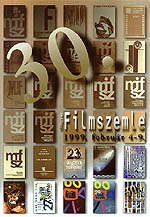 |
| 30th Hungarian Film Week |
K I N O E Y E:
Looking Back (Part I)
Gabor Tompa's Kinai vedelem
Andrew J Horton
The twentieth century has been a tragic one for Central Europe, not the happiest of places even at the best of times. Whilst the last hundred years have brought little personal happiness, they have provided writers and film directors with much inspiration for powerful and soul-searching works. Gabor Tompa draws on this deep well of history for his first feature film Kinai vedelem (Chinese Defence, 1999).
 Peter Gyorgy's homecoming is not quite what he imagined it to be. For a start, he finds that in the twenty-two years he has been away, Transylvania has ceased to be a part of Hungary, and his homeland is no longer the country he thought it was. What is worse, he is far from welcome there. His story of two decades of incarceration in the Siberian gulag are an embarrassment to the local authorities, who are keen to keep in line with Party orthodoxy by deifying the Soviet Union as a source of infinite benevolence.
Peter Gyorgy's homecoming is not quite what he imagined it to be. For a start, he finds that in the twenty-two years he has been away, Transylvania has ceased to be a part of Hungary, and his homeland is no longer the country he thought it was. What is worse, he is far from welcome there. His story of two decades of incarceration in the Siberian gulag are an embarrassment to the local authorities, who are keen to keep in line with Party orthodoxy by deifying the Soviet Union as a source of infinite benevolence.
 The embarrassment is intended. Gyorgy, formerly a Horthyist soldier, was released from the gulag by the Chinese army during an incursion into Soviet Siberia. His liberators then gave him some dollars and a travel permit and sent him home in order that his story might stir up Romanian-Russian relations, to the benefit of the Chinese.
The embarrassment is intended. Gyorgy, formerly a Horthyist soldier, was released from the gulag by the Chinese army during an incursion into Soviet Siberia. His liberators then gave him some dollars and a travel permit and sent him home in order that his story might stir up Romanian-Russian relations, to the benefit of the Chinese.
 Gyorgy, naturally enough, has little understanding of the political game in which he is caught up and stumbles through the film dazed and confused. Even the landscape he once knew so well has changed beyond recognition. Little by little, he is stripped of all the symbols of his dignity, his dollars, his shaggy appearance and finally his love.
Gyorgy, naturally enough, has little understanding of the political game in which he is caught up and stumbles through the film dazed and confused. Even the landscape he once knew so well has changed beyond recognition. Little by little, he is stripped of all the symbols of his dignity, his dollars, his shaggy appearance and finally his love.
Kinai vedelem, based on the book of the same name by Laszlo Csiki, is well placed to document the oddities of the Communist years. However, it fails, because this is all it does.  It becomes so wrapped up in the political intrigue that it fails to convey what Communism was like in human terms. Thus, it reduces the Communist years to a cartoon strip, with the characters taking second place to a cliched set of symbols of what Communism represents to us now, ranging from clapped-out Renault Dacias to gross violations of human rights. By definition, these stereotypes are derived from what we already know about Communism and, therefore, cannot provide us with new information. This leaves us with a somewhat hollow film based on rather interesting subject matter. The latter, alas, cannot redeem the former.
It becomes so wrapped up in the political intrigue that it fails to convey what Communism was like in human terms. Thus, it reduces the Communist years to a cartoon strip, with the characters taking second place to a cliched set of symbols of what Communism represents to us now, ranging from clapped-out Renault Dacias to gross violations of human rights. By definition, these stereotypes are derived from what we already know about Communism and, therefore, cannot provide us with new information. This leaves us with a somewhat hollow film based on rather interesting subject matter. The latter, alas, cannot redeem the former.
Andrew J Horton, 12 April 1999

![]()

 Peter Gyorgy's homecoming is not quite what he imagined it to be. For a start, he finds that in the twenty-two years he has been away, Transylvania has ceased to be a part of Hungary, and his homeland is no longer the country he thought it was. What is worse, he is far from welcome there. His story of two decades of incarceration in the Siberian gulag are an embarrassment to the local authorities, who are keen to keep in line with Party orthodoxy by deifying the Soviet Union as a source of infinite benevolence.
Peter Gyorgy's homecoming is not quite what he imagined it to be. For a start, he finds that in the twenty-two years he has been away, Transylvania has ceased to be a part of Hungary, and his homeland is no longer the country he thought it was. What is worse, he is far from welcome there. His story of two decades of incarceration in the Siberian gulag are an embarrassment to the local authorities, who are keen to keep in line with Party orthodoxy by deifying the Soviet Union as a source of infinite benevolence.  The embarrassment is intended. Gyorgy, formerly a Horthyist soldier, was released from the gulag by the Chinese army during an incursion into Soviet Siberia. His liberators then gave him some dollars and a travel permit and sent him home in order that his story might stir up Romanian-Russian relations, to the benefit of the Chinese.
The embarrassment is intended. Gyorgy, formerly a Horthyist soldier, was released from the gulag by the Chinese army during an incursion into Soviet Siberia. His liberators then gave him some dollars and a travel permit and sent him home in order that his story might stir up Romanian-Russian relations, to the benefit of the Chinese. Gyorgy, naturally enough, has little understanding of the political game in which he is caught up and stumbles through the film dazed and confused. Even the landscape he once knew so well has changed beyond recognition. Little by little, he is stripped of all the symbols of his dignity, his dollars, his shaggy appearance and finally his love.
Gyorgy, naturally enough, has little understanding of the political game in which he is caught up and stumbles through the film dazed and confused. Even the landscape he once knew so well has changed beyond recognition. Little by little, he is stripped of all the symbols of his dignity, his dollars, his shaggy appearance and finally his love.  It becomes so wrapped up in the political intrigue that it fails to convey what Communism was like in human terms. Thus, it reduces the Communist years to a cartoon strip, with the characters taking second place to a cliched set of symbols of what Communism represents to us now, ranging from clapped-out Renault Dacias to gross violations of human rights. By definition, these stereotypes are derived from what we already know about Communism and, therefore, cannot provide us with new information. This leaves us with a somewhat hollow film based on rather interesting subject matter. The latter, alas, cannot redeem the former.
It becomes so wrapped up in the political intrigue that it fails to convey what Communism was like in human terms. Thus, it reduces the Communist years to a cartoon strip, with the characters taking second place to a cliched set of symbols of what Communism represents to us now, ranging from clapped-out Renault Dacias to gross violations of human rights. By definition, these stereotypes are derived from what we already know about Communism and, therefore, cannot provide us with new information. This leaves us with a somewhat hollow film based on rather interesting subject matter. The latter, alas, cannot redeem the former.